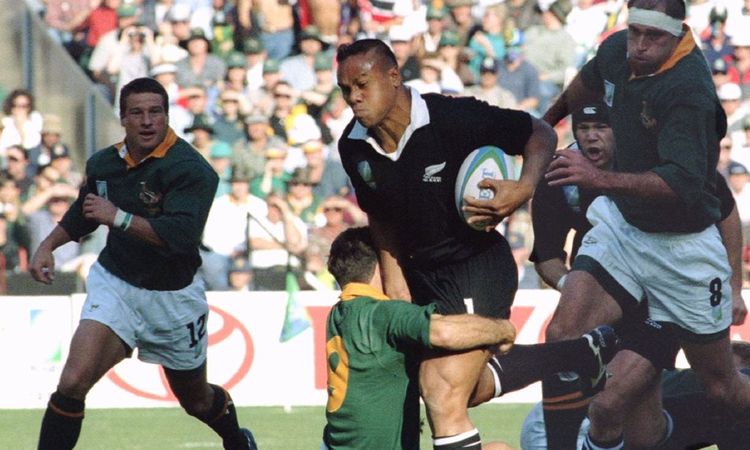
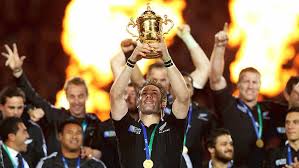
LONDON, ENGLAND – Ask almost anyone who will win the Rugby World Cup this year, and the answer should be somewhere close to unanimous: New Zealand.
The All Blacks are so good they have transcended rugby and entered the rarified atmosphere of mythic sporting status. They arerugby, in the same way that Brazil is soccer, cricket is the West Indies, Ayrton Senna is motorsport, and Usain Bolt is sprinting.
Their record is beyond extraordinary. An overall win rate since their first international back in 1903 of 76%. Thirteen out of 19 Tri-Nations/Rugby Championship titles. More time as the world’s top rugby nation since rankings were introduced in 2003, and recognised as the best on the planet long before it was officially recognised. And they were named World Rugby Team of the Year for the seventh time in 2014.
They boast the most capped player in world rugby in Richie McCaw, and the leading points scorer in Dan Carter. No fewer than three of their players are in the top 10 try scorers of all time. No side has scored more points in international rugby. Pick a year, any year, and the New Zealand roster will draw gasps of shock and awe from rugby fans.
Since 2012, they have won every home Test and only lost three away – in England, South Africa, and – earlier this summer – Australia.
The World Cup is theirs to lose.
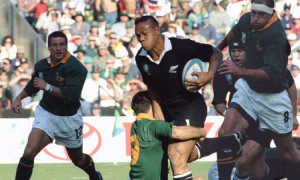
The thing is, though, they have form for doing just that – losing the World Cup. Although their record in the competition is on the very, very side of very, very good, it is not as impressive as it should be for a team that dominates a sport as completely as the All Blacks.
New Zealand have a reputation for choking on the biggest rugby stage.
Yes, they are double World Champions – but so are South Africa and Australia. And South Africa have only played in five World Cups. They were barred from the first two competitions because of Apartheid.
There was a 24-year, six tournament gap between New Zealand’s two World Cups – both wins coming on home soil. In the intervening period, South Africa won twice, in 1995 and 2007. As did Australia, in 1991 and 1999.
Both Australia and South Africa have won overseas. In fact, both Australia’s wins came overseas. England – the only northern hemisphere side to lift the trophy – won in Australia in 2003.
So, history suggests that New Zealand need home advantage to win a World Cup and / or a quarter of a century of team-building. That’s not so great – especially not if you’re the greatest rugby-playing nation ever.
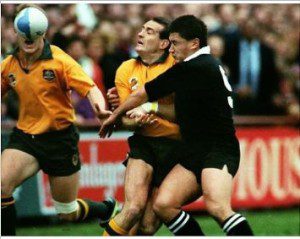
In 1991, then-title holders New Zealand lost in the semi-finals to Australia. History, with its love of ‘story’, will insist David Campese and that over-the-shoulder pass to Tim Horan was the difference between the two sides – but the game wasn’t just that pass or that man.
History, wearing its rose-tinted glasses selectively ignores the other 79 minutes of rugby which took place on that day. Sure, it was a big moment in the game, but that’s all it was. A moment. Australia played a near-perfect first 40 minutes, but the final score was only 16-6.
It’s not even as if Campo’s pass came in the last moment. That happened in 2003, when Australia took the defence of their title all the way to the final. They lost 20-17 after extra-time thanks to Jonny Wilkinson’s drop goal 26 seconds before the whistle. In 2007, England – somehow – also took the defence of their title all the way to the final.
Australia, England and France can match the All Blacks’ three final appearances. Australia even boast the same won two, lost one record. The Springboks have reached the final twice – and have won both times.
New Zealand are incredibly good at marching to the gates of the final. At making it look like another title is inevitable. They have never lost a pool game and have always qualified for the knockout phase as pool winners. At the first five World Cups, between 1987 and 2003, they reached the last four every time. Their worst World Cup was in 2007, when they lost by two points to arch-nemesis and host nation France at the quarter-final stage.
Then, with their pre-tournament favourite tags apparently justified each time, they bottled it.
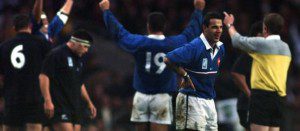
Ah, yes, some will argue, but the All Blacks were undone by French flair in two World Cups – in 1999 and 2007? Because after all no one, not even the mighty All Blacks, can account for the match-in-a-million mystery that is “French flair”, which can when the fancy takes it, leap tall buildings in a single bound, change physical laws and upset even the most overwhelming rugby odds.
No. That’s an excuse – and a flimsy one at that. You can just about make a case for French flair in 1999. It was a pretty impressive second-half comeback, after all – but even then it was mostly Christophe Lamaison and his kicking boot.
In 2007, what beat the All Blacks was the opposite of French flair. It was anti-flair. It was Bernard Laporte. It was rigid, almost Roman Empire organisation. It was monstrous forward power. It was the howitzer boot of Damien Traille. And – Kiwis will tell you – it was referee Wayne Barnes.
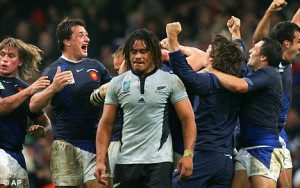
Then-coach Graham Henry even pointed out Mr Barnes’ ‘17 mistakes’ in an official report to New Zealand rugby authorities as he explained why the All Blacks’ failed to win in France. Because, you know, they couldn’t possibly have choked then, too.
So, one pass by one player was too much for the All Blacks in 1991. French flair did for them in 1999 and again – this time aided and abetted by referee Wayne Barnes – in 2007. In 1995 in South Africa, it was historical imperative, Nelson Mandela … and the mysterious “Suzie”, who briefly worked at the South African hotel where the All Blacks were staying and who may have poisoned their coffee two days before the final.
It wasn’t that South Africa found a way to nullify Jonah Lomu on the pitch. Once they had done that, a task that was much easier said than done, New Zealand’s threat was … reduced. But they played pretty well for poisoned players, and took the final to extra time.
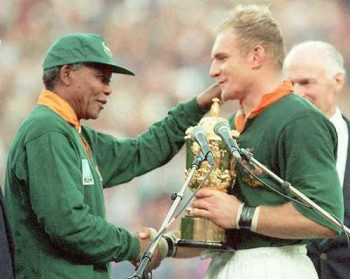
Which just leaves 2003. Another game, another semi-final that New Zealand should have won, distilled by history into a single moment, when Stirling Mortlock intercepted a less-than accurate Carlos Spencer pass.
So, what does this all mean for the 2015 Rugby World Cup in England? Nothing.
New Zealand, rightly, start as favourites. They should saunter through their pool unbeaten again, and should win their quarter-final and semi-final matches comfortably enough. At the end of the final, Richie McCaw should raise the Webb Ellis trophy aloft and head into history, legend assured, as the first All Black captain to lift the trophy on foreign soil.
Right now, everything is as it should be. But then, everything was as it should have been before the World Cups in 1991, 1995, 1999, 2003, and 2007. In those years, at those World Cups, the title was New Zealand’s for the taking. Then they choked.
Feel free to comment below, look for and “Like” our Facebook Rugby Wrap Up Page and follow us on Twitter@: RugbyWrapUp, James Harrington, Junoir Blaber, Jamie Wall, Nick Hall, DJ Eberle, Jake Frechette, Scheenagh Harrington, Jamie Loyd, Cody Kuxmann, Karen Ritter, Audrey Young, Akweley Okine and Declan Yeats, respectively.

